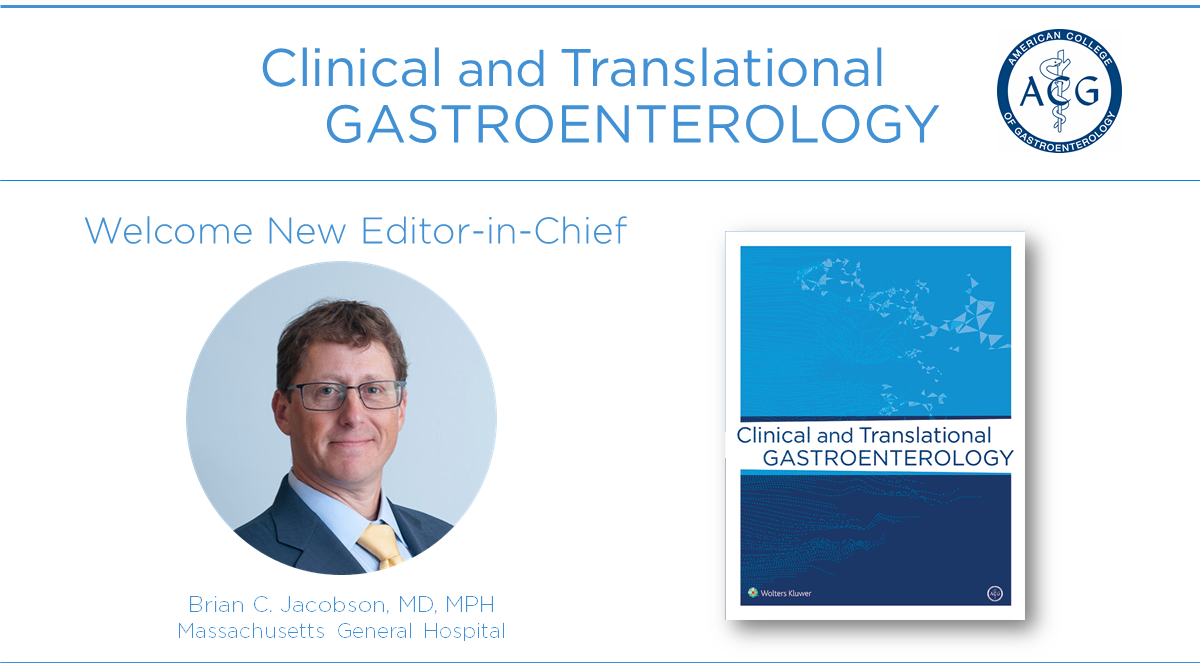
The American College of Gastroenterology welcomes Brian Jacobson, MD, MPH, as the new Editor-in-Chief of Clinical & Translational Gastroenterology. Dr. Jacobson answered five questions to give ACG members the opportunity to better get to know him.
Q: Over the course of your research career, what subject area did you most enjoy investigating?
A: This question is akin to asking “which of your children do you love the most?” I’ve studied a range of topics from “how best to feed patients after acute pancreatitis?” to “does weight gain have an association with gastroesophageal reflux and Barrett’s esophagus, even if you’re not obese?” to “does it really matter what people eat the day before their colonoscopy?” Currently, I’m working on a project to develop a more accurate diagnostic coding system for predicting future healthcare utilization. Throughout my career, I’ve always gravitated toward questions that ultimately have a direct impact on patient care. While I cherish my one-to-one interactions with patients, I realized early on in my career that I could magnify my impact as a physician, and help more people in a positive way, by finding answers to important clinical questions. I think research is a way for investigators, regardless of whether they are healthcare providers or basic scientists, to help others on a large scale.
Q: What first attracted you to the field of gastroenterology?
A: During medical school at the Albert Einstein College of Medicine, I had the great fortune to work with both Larry Brandt and Les Bernstein, not to mention a promising junior attending named David Greenwald! Larry and Les were the two most consummate clinicians I had met as an impressionable medical student. They had amazing bedside manners, were incredible public speakers, and knew more internal medicine—not just gastroenterology—than anyone else I had encountered. I thought, “if these two people are BOTH in GI, there must be something really special about this field.” Our specialty requires extensive knowledge of medicine in general, and when you throw in the interesting variety of conditions we treat, along with the ability to perform endoscopic procedures, there was no chance I was going to land anywhere else.
Q: What are you most excited about in research right now?
A: I think I’m most excited about the growing awareness that science needs to do more to help everyone, not just some populations. Today there is greater recognition that societal and cultural biases can adulterate science and that social determinants are vital confounding variables to consider in nearly all aspects of research. As we enter a new age of investigation that relies on big data and artificial intelligence, it is vital that we understand how data can be misinterpreted if viewed through only one or two specific contexts.
Q: Is there a mentor who really made a difference in your career?
A: During my fellowship at Brigham and Women’s Hospital in the late ’90s, I worked closely with Peter Banks, a renowned pancreatologist and visionary. He made it possible for me to obtain my Master of Public Health degree and inspired me to devote considerable efforts to research. Throughout his career, he has demonstrated the importance of selfless promotion of trainees and colleagues and serves as a reminder that there is no greater joy than helping others succeed.
Q: What do you think sets CTG apart from other GI-related journals?
A: I’m very excited about the open-access, web-based format. I think free, readily available access to knowledge by clinicians and researchers worldwide is so important for improving patient care and advancing our field. We will be exploring ways to capitalize on the web-based format, with greater use of hyperlinks to make it easy for readers to jump to additional relevant information in other journals and on the ACG website. Not having a print version of the journal opens up other potentially exciting ways to share online content, including through social media platforms. I also think our translational research focus provides a forum for investigators to share research inclusive of public health dimensions that impact the human experience, including poverty, access to education and healthcare, and all forms of inequality.

